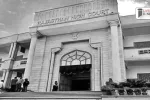Decree Void for Lack of Jurisdiction, Emphasizes on Adjudication of Jurisdiction Before Decreeing: Supreme Court

“A decision rendered by a court on the merits of a controversy without first adjudicating on its competence…would amount to a decision being rendered on an illegal and erroneous assumption of jurisdiction.”
The Supreme Court, in a landmark judgment (Civil Appeal No. 9695 of 2013), delivered by Justices B.R. Gavai, Dipankar Datta, and Aravind Kumar, has declared a decree void and inexecutable due to the Trial Court’s failure to adjudicate its own competence. The case, involving Asma Lateef & Anr. vs. Shabbir Ahmad & Ors., revolved around the execution of a decree related to an alleged oral gift of property.
The Court emphasized the importance of jurisdictional adjudication, stating, “A decision rendered by a court on the merits of a controversy without first adjudicating on its competence…would amount to a decision being rendered on an illegal and erroneous assumption of jurisdiction.”
The appeal challenged the Allahabad High Court’s judgment concerning the maintainability of the suit under the UPZA & LR Act and the validity of a sale deed amidst pending litigation. The Supreme Court upheld the High Court’s decision, agreeing that the Trial Court’s decree against one of the defendants, Samiullah, was inexecutable as it lacked inherent jurisdiction.
In its detailed analysis, the Supreme Court clarified the requirements for a judgment and decree under the CPC, noting, “It is only a ‘judgment’ conforming to the provisions of the CPC that could lead to a ‘decree’ being drawn up.”
The case also brought into focus the transfer of property during pending litigation. The Supreme Court did not make a definitive ruling on the sale deed’s validity in favor of the Purchasers (Respondents 1 to 3), stating that this aspect should be determined by a competent forum.
Furthermore, the Court discharged the Court Receiver appointed for the property, directing that accounts related to the property be settled in accordance with the law.
Date of Decision: 12th January 2024
ASMA LATEEF & ANR. VS SHABBIR AHMAD & ORS.





